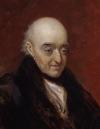Happy is he who loves companionship,
And lights on thee, Luigi. Thee I found,
Playing at Mora on the cabin-roof
With Punchinello. -- 'Tis a game to strike
Fire from the coldest heart. What then from thine?
And, ere the twentieth throw, I had resolved,
Won by thy looks. Thou wert an honest lad;
Wert generous, grateful, not without ambition.
Had it depended on thy will alone,
Thou wouldst have numbered in thy family
At least six Doges and the first in fame.
But that was not to be. In thee I saw
The last, if not the least, of a long line,
Who in their forest, for three hundred years,
Had lived and laboured, cutting, charring wood;
Discovering where they were, to those astray,
By the re-echoing stroke, the crash, the fall,
Or the blue wreath that travelled slowly up
Into the sky. Thy nobler destinies
Led thee away to justle in the crowd;
And there I found thee -- trying once again,
What for thyself thou hadst prescribed so oft,
A change of air and diet -- once again
Crossing the sea, and springing to the shore
As though thou knewest where to dine and sleep.
First in Bologna didst thou plant thyself,
Serving behind a Cardinal's gouty chair,
Listening and oft replying, jest for jest;
Then in Ferrara, every thing by turns,
So great thy genius, and so Proteus-like!
Now serenading in a lover's train,
And measuring swords with his antagonist;
Now carving, cup-bearing in halls of state;
And now a guide to the lorn traveller,
A very Cicerone -- yet, alas,
How unlike him fulmined in old Rome!
Dealing out largely in exchange for pence
Thy scraps of Knowledge! -- thro' the grassy street
Leading, explaining -- pointing to the bars
Of Tasso's dungeon, and the latin verse,
Graven in the stone, that yet denotes the door
Of Ariosto.
Many a year is gone
Since on the Rhine we parted; yet, methinks,
I can recall thee to the life, Luigi,
In our long journey ever by my side;
Thy locks jet-black, and clustering round a face
Open as day and full of manly daring.
Thou hadst a hand, a heart for all that came,
Herdsman or pedlar, monk or muleteer;
And few there were, that met thee not with smiles.
Mishap passed o'er thee like a summer-cloud.
Cares thou hadst none; and they, that stood to hear thee,
Caught the infection and forgot their own.
Nature conceived thee in her merriest mood,
Her happiest -- not a speck was in the sky;
And at thy birth the cricket chirped, Luigi,
Thine a perpetual voice -- at every turn
A larum to the echo. In a clime,
Where all were gay, none were so gay as thou;
Thou, like a babe, hushed only by thy slumbers;
Up hill and down, morning and noon and night,
Singing or talking; singing to thyself
When none gave ear, but to the listener talking.
Italy : 15. Luigi
written bySamuel Rogers
© Samuel Rogers






